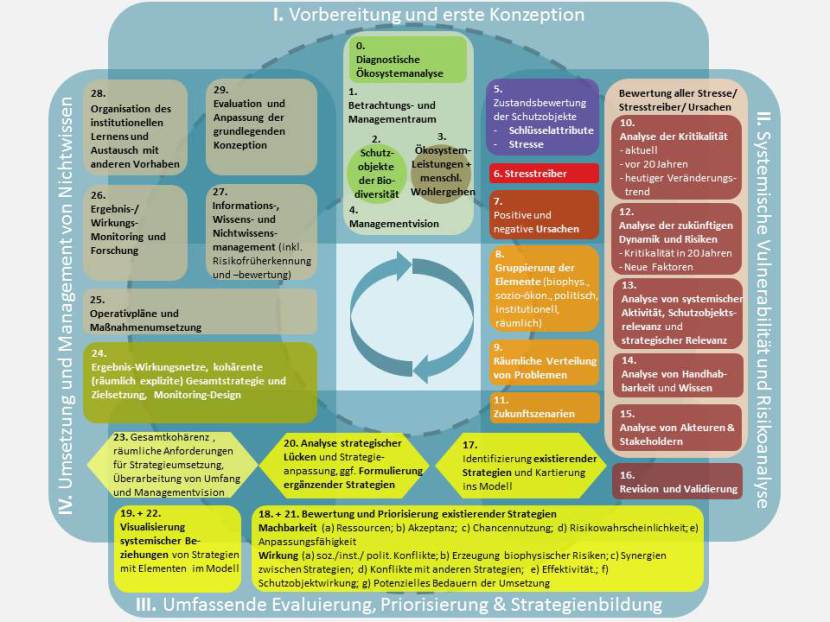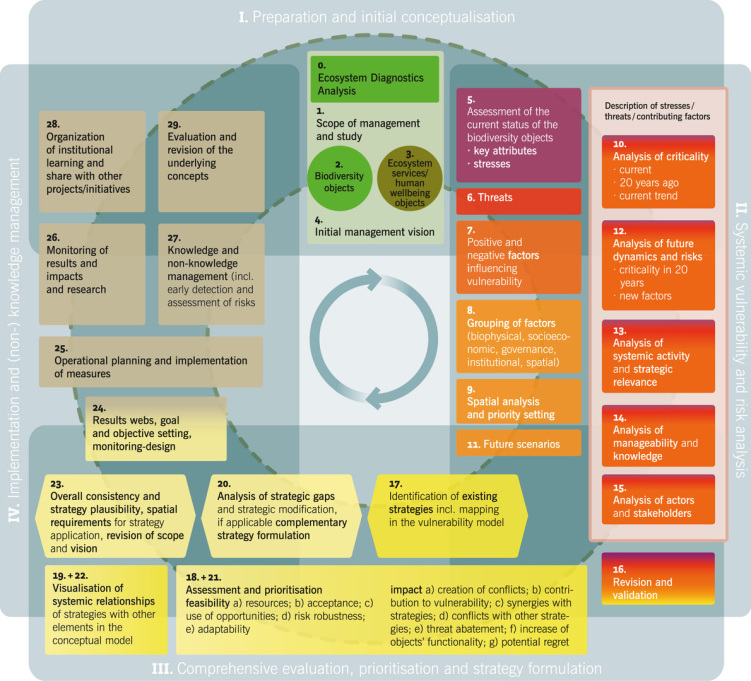Dezember 2019 - Weitere Überarbeitung der Methodik
Die MARISCO-Methodik wurde weiter überarbeitet und das Konzept für die Software zusammengestellt.
Die bisherige Methodik umfasst insgesamt 29 aufeinander aufbauende Schritte. In jedem Schritt werden verschiedene Fragestellungen bzw. Themen systematisch bearbeitet. Anhand von partizipativen Workshops mit Akteuren unterschiedlichster gesellschaftlicher Schichten (z.B. Bürger, Verwaltung, Fachexperten, Planer, NGOs, GOs) werden gemeinsam systemische Wissenskarten erstellt, die das Wissen bzw. Lücken im Wissen der teilnehmenden Akteure widerspiegeln. Diese Wissenskarten werden im weiteren Verlauf eines Projektes adaptiv weiterentwickelt. Die partizipativen Workshops sollen so früh wie möglich im Projekt stattfinden, um gemeinsam das Ökosystem zu analysieren und Lösungen zu finden - entgegen der gängigen Praxis einer Akteursbeteiligung am Ende einer Planung. Damit wird die Akzeptanz eines Projektes erhöht.
Bei der Erstellung einer Wissenskarte eines Projektes bildet das jeweilige vorkommende Ökosystem bzw. die jeweiligen Ökosysteme die Basis. Im nächsten Schritt werden die ökologischen Schlüsselattribute der Ökosysteme identifiziert (z.B. Anzahl der Baumarten), sowie die Ökosystemdienstleistungen (z.B. Holzeinschlag) herausgearbeitet, die für den Menschen bereitgestellt werden. Diese Ökosystemdienstleistungen tragen direkt zum menschlichen Wohlergehen bei. Doch auch soziale Systeme (z.B. Schulen) tragen mit ihren Diensten (z.B. Bildung) zum menschlichen Wohlergehen bei und können dann zusammen analysiert werden. Nun werden die Herausforderungen analysiert, wobei zuerst die in den Ökosystemen auftretenden Stresse (z.B. Trockenstress) erfasst werden.
Danach werden die Stresstreiber (z.B. anhaltende Dürreperioden) sowie die Ursachen (z.B. steigender CO2 Ausstoß) analysiert. Die systemische und systematische Arbeitsweise anhand solcher Wissenskarten ermöglicht die Erarbeitung ganzheitlicher und nachhaltiger Lösungsansätze, die bei den Ursachen der auftretenden Probleme ansetzen können anstatt symptomatisch zu behandeln. Damit wird eine vernetzte Wirkungsweise sichtbar, die im Gegensatz zur traditionellen, linearen Sichtweise der Komplexität unserer heutigen Zeit gerechter wird. Dadurch wird eine nachhaltige und ganzheitliche Entwicklung von Strategien möglich.
Die Entwürfe der überarbeiteten Methodik und der geplanten Software werden im weiteren Verlauf des Projektes vorgestellt.
December 2019 - further revision of the methodology
The MARISCO methodology was further revised and the concept for the software was put together.
The previous methodology comprises a total of 29 successive steps. In each step, various questions or topics are systematically dealt with. On the basis of participatory workshops with actors from different social backgrounds (e.g. citizens, administration, experts, planners, NGOs, GOs), systemic knowledge maps are created that reflect the knowledge or gaps in the knowledge of the participating actors. These knowledge maps are adaptively developed further in the course of a project. The participatory workshops should take place as early as possible in the project in order to jointly analyze the ecosystem and find solutions - contrary to the common practice of involving stakeholders at the end of planning. This increases the acceptance of a project.
When creating a knowledge map of a project, the respective occurring ecosystem / ecosystems form the basis. In the next step, the key ecological attributes of the ecosystems are identified (e.g. number of tree species), and the ecosystem services (e.g. logging) that
are made available to humans are worked out. These ecosystem services contribute directly to human wellbeing. But social systems (e.g.
schools) also contribute to human wellbeing with their services (e.g. education) and can then be analyzed together. Now the challenges are analyzed, whereby, first of all, the stresses occurring in
the ecosystems (e.g. drought stress) are recorded.
Then stress drivers (e.g. persistent droughts) and their causes (e.g. increasing CO2 emissions) are analyzed. The systemic and systematic
working method based on such knowledge maps enables the development of holistic and sustainable approaches that can address the causes of the problems that arise instead of treating them
symptomatically. This makes a network-mode of action visible, which, in contrast to the traditional, linear view of the complexity of our times, is more just. This enables a sustainable and holistic
development of strategies.
The drafts of the revised methodology and the planned software will be presented in the further course of the project.




